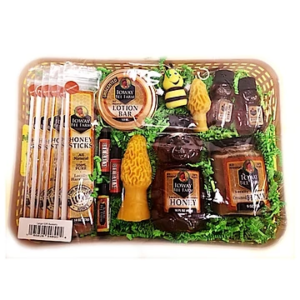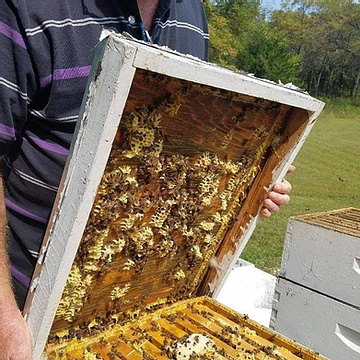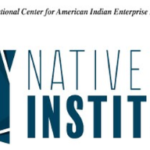Founded in 2016, Ioway Bee Farm is owned and operated by the Iowa Tribe of Kansas and Nebraska, and located in White Cloud, Kansas. With the idea first coming from a tribal elder and beekeeper, the Tribe purchased a single hive and has since grown the operation to 54 hives and 2 million bees. By 2019, the farm was producing 1,100 pounds of honey a year, all while utilizing the traditional indigenous practice of regenerative agriculture. Ioway Bee Farm even went viral on social media this summer, boosting sales and driving revenue that has helped sustain the business with record sales – but also presented new challenges to keep up with surging demand. Now, the tribe is expanding its use of regenerative agriculture with a new venture, SOJE Native hemp cigarettes – launching this winter.
We talked to the Iowa Tribe of Kansas and Nebraska to learn more Ioway Bee Farm, indigenous agriculture, and the tribe’s other economic ventures. We hope you enjoy learning about Ioway Bee Farm!
1. Tell us a little about the Iowa Tribe of Kansas and Nebraska. Where is your community located?
The operations of the Iowa Tribe of Kansas and Nebraska are based on its federally established reservation covering approximately 12,038 acres across portions of Brown County and Doniphan County in Northeast Kansas and Richardson County in Southeast Nebraska. The reservation was established and modified pursuant to a series of treaties, with the current boundaries established in the Treaty of March 6, 1861. The Iowa Tribe of Kansas and Nebraska currently controls approximately 4,860 acres of its reservation with most of this land held in trust.
2. Tell us about the Ioway Bee Farm. When did the Ioway Bee Farm open? How did the tribe decide to open a bee farm?
The Ioway Bee Farm, owned and operated by the Iowa Tribe of Kansas and Nebraska in White Cloud, Kansas, was founded in the spring of 2016 and houses bees across the reservation near our row crops, conservation areas, and nature sights. Prior to the beginning of the farm we were contacted by elder Pete Fee, who had raised bees and sold honey from his home for years. Fee asked if there was any interest in getting the Tribe involved with raising bees. The Tribe initially purchased one hive and placed it on Dupuis Hollow, an area free from the synthetic chemicals common with traditional agriculture.
“Quickly we began to learn more about the benefits of bees on the environment and our food system” said Chairman Tim Rhodd.”
He knew this was something that could benefit our agriculture-based community and food sovereignty for the Tribe. Feeling confident, the Tribe decided to purchase more hives and the equipment to start a full-fledged bee farm with start-up costs covered by the Tribal Historic Preservation Office.
“When everything arrived, the Tribal community and tribal employees came together to get the project started. Nothing was assembled, or painted, it was all new. So, we all had to come together to get the hives built for our new bees to be housed in.” Rhodd said. “It was great to see a sense of community being built right along with the farm.”
What started as one hive quickly became a fully functioning bee farm including 54 hives and housing over two million bees.
“It’s been amazing to look back and see where we started, and how far we have come,” Rhodd said. “The Ioway Bee Farm now plays an important role in the local ecosystem, helping plants flourish and grow in a natural environment, transferring pollen between flowering plants, increasing biodiversity, and bringing pollinators back to the land.”
By 2019, under the management of veteran beekeeper Jimmy Lunsford, the Ioway Bee Farm was producing over 1,100 pounds of honey, steadily growing the business, and bringing jobs back to the community.
“I grew up learning about the bee business and it’s been a passion all of my life, said Jimmy. “When I was younger, I’d watch them go from tree to tree gathering pollen and nectar, stopping and taking a rest on the forest mushrooms. The bees show the interconnectedness of nature.”
The honey is raw, organic, and is never overly processed, ensuring that all of the incredibly healthy enzymes are kept alive. Raw honey, one of nature’s superfoods, is packed with antioxidants, and various anti-inflammatory, antiviral, and antibacterial properties. When applied externally raw honey may also help heal minor skin wounds and burns, aid in digestive health, and soothe sore throats.
3. How has the tribe and Ioway Bee Farm incorporated indigenous agriculture processes into their practices?
The Tribe has reclaimed our traditional Indigenous way of farming to heal our soils. Regenerative Agriculture is not a new concept, but a way of working with the land that Native Americans have done for time immemorial. Through the leadership of Chairman Rhodd, the Tribe aims to focus on regenerating its soil health while restoring the natural habitats for many different species. Regenerative agriculture not only promotes the health of the land but also helps the Tribe meet its goals of providing nutrient-dense, natural foods to tribal members and the local community.
Diabetes and cancer rates are a growing concern across Indian Country, with Native Americans twice as likely to develop the disease than other groups of non-Natives. By making healthier food more accessible we can reduce the number of diabetes cases and promote a healthier lifestyle for all. In 2021, the tribe will be introducing a number of native food plots that will serve the community through small scale incubator farms and greenhouses. These farms are being led by the tribe’s youth and farm employees to help build entrepreneurship, feed the community with highly nutritious foods, and conserve at-risk plants on the reservation that carry importance towards the tribe’s indigenous cuisine and culture.
Through the diversification of the tribe’s agricultural systems through multi-species crop planning, adaptive grazing, and the use of cover crops, the Tribe has been able to make regenerative agriculture a key component to the success of its agricultural ventures. Placing all projects under the umbrella of regenerative agriculture is leading to a renewed interest in indigenous agriculture and food sovereignty within the community all while building back the health of the native soils. The tribe is currently growing its herd of pasture raised angus beef cattle, which graze on crop residues and naturally fertilize the land while reducing the inputs the tribe uses on its farms. The bees help with pollination and help reduce pest pressure on their crops, and through the use of cover crops they are further reducing their need for fertilizers, pesticides, herbicides, and other conventional farming techniques.
4. Tell us about other Iowa Tribe of Kansas and Nebraska economic ventures/programs, such as the Industrial Hemp Program.
In addition to its row crop farm, the Tribe has recently joined the industrial hemp industry and was the fourth tribe in the United States to gain approval for its industrial hemp program.
“Industrial hemp was once a major part of the agricultural landscape of Kansas pre-prohibition and the ancestors of those plants are still found all throughout the reservation along ditches and roadsides,” said Artees Vanett, director of the Iowa Tribe of Kansas and Nebraska Hemp Program. “We are bringing this plant back now to the reservation and are becoming leaders for regenerative hemp production in Indian Country.”
The tribe is bringing innovative thinking and vertical integration to its hemp program and has developed SOJE—the Ioway word for smoke—the first Native hemp cigarette brand which uses traditional Native American smoking herbs. Utilizing bearberry, prairie sage, and lobelia, along with regeneratively produced hemp, SOJE creates a distinctively different smoking experience. SOJE acts not only as a way for the tribe to vertically integrate its business, but as a way to help foster economic development for the tribe and other native communities. 100% of the revenues go directly back to Native American communities through the support of regenerative agriculture projects and tribal entrepreneurship programs.
5. How has the Ioway Bee Farm been managing through the pandemic?
“We really couldn’t be where we are today without the support of our tribal membership and our local community.” said Chairman Rhodd.
Before COVID-19, the bee farm was nearing a turning point; business was hard and its future was unsure. But, on July 4th, 2020, one of the tribe’s members posted a message of support for the bee farm onto Tumblr and the post was shared over 40,000 times across the globe. This support led to a huge surge in business and in two days Ioway Bee Farm received more business than it had in a year! Orders were coming in every ten seconds and we were at first totally shocked.
We thought it couldn’t be real, but we called our web host and our payment processor, and they confirmed it was all actually happening. We had to scale our business very rapidly to keep up with the orders and now, five months later, are still feeling the effects of this one point. Our online business has grown by over 196% since last year and we are continuing to see the impact that social media can have on our business. During COVID-19 we’ve found it especially important to put additional resources towards marketing, social media, and ecommerce. We live in a virtual world and we must now adapt to these changes while still keeping true to our beliefs and traditions.
6. Is there anything else you would like to share with our readers?
You can find the Ioway Bee Farm raw honey products such as honey bears, bee pollen, and beeswax candles online at www.IowayBeeFarm.com, and SOJE, our hemp cigarette brand at www.SOJE.co which is launching this December. Follow us online on instagram at @sojehemp and @iowaybeefarm and on Facebook at www.facebook.com/sojehemp and www.facebook.com/iowaybeefarm. Learn more about the tribe at www.Iowatribeofkansasandnebraska.com and on Facebook at www.facebook.com/iowatribeofksne.












